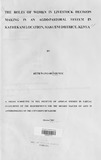| dc.contributor.author | Ndungu, Beth W | |
| dc.date.accessioned | 2013-05-10T11:47:38Z | |
| dc.date.available | 2013-05-10T11:47:38Z | |
| dc.date.issued | 2002 | |
| dc.identifier.uri | http://erepository.uonbi.ac.ke:8080/xmlui/handle/123456789/21329 | |
| dc.description.abstract | This study was a survey consisting of individual male and female household heads in Kathekani Sub-location of Makueni District. Wealth ranking was used to select both the focus group discussion members and those involved in the formal survey and the data analysed both quantitatively and qualitatively using descriptive statistics. Interest in gender roles and responsibilities assigned to women and men in a specific society has been growing for more than ten years. This is due to the realization that women often do not benefit from development activities and in some cases become even -, poorer and more marginalized. In this regard the study examined how the increase in women's labour contribution in livestock production have affected their control over decisions regarding livestock management and marketing. The transactional approach was used to examine gender relations in livestock production in a rural agro- pastoral area in Kenya. According to the study, the structure of the division of labour in the livestock sector has changed with an expansion of women's role as women takes up many of the tasks meant for men. Some of the causes of these changes include: male labour out migration, school participation of children and off farm employment. The results of the study further revealed that despite their increased labour, women do not enjoy a corresponding increase in their decision-making ability in the livestock sphere. Women of high status as depicted by their education, occupation, and economic levels were, however, shown to participate more in decisions regarding livestock. On the basis of the implications of the findings, this study recommended that since high education and economic status was seen to affect the decision making ability of women in the Akamba community positively, any efforts aimed at empowering women in livestock decision making to first improve women's status through increased education opportunities and participation in formal employment in order to give them independent Incomes. The changes that have occurred in the structure of the division of labour have resulted in higher female participation in livestock tasks that does not correspond to their decision-making ability. This is attributed to patriarchal structure in which power control and property ownership basically resides with men. The study recommended an intensification of public awareness campaigns to educate men to change their attitude and behavior to the changing circumstances. Researchers, extentionists and any other key players in the livestock sphere should be sensitized in order for them to target the right client in livestock. | en |
| dc.description.sponsorship | The University of Nairobi | en |
| dc.language.iso | en | en |
| dc.subject | The roles of women in livestock decision making | en |
| dc.subject | Kathekani location, Makueni district | en |
| dc.title | The roles of women in livestock decision making in an agro-pastoral system in Kathekani location, Makueni district, Kenya | en |
| dc.type | Thesis | en |
| local.publisher | Institute of anthropology, gender and African studies | en |

